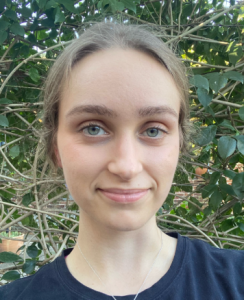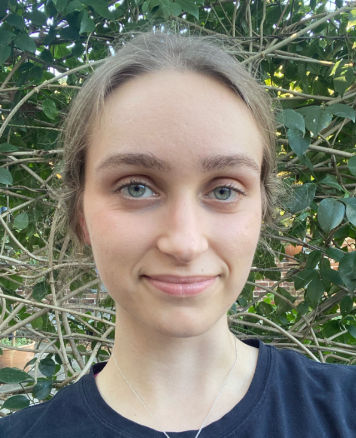Georgia Loadsman is a writer from Sydney’s Inner West. She enjoys reading anything and everything but has a particular love for speculative fiction, which comes across in her writing. In 2023 Georgia completed a Bachelor of Communication (Hons) in Creative Writing at the University of Technology Sydney, and she is currently working towards a Graduate Diploma in Digital Marketing. ‘Penelope Seven’ is her second published piece of fiction.
What inspired you to write ‘Penelope Seven’?
“I was initially inspired by an article about the use of MRIs to communicate with those presumed to be in a ‘vegetative state’. It got me thinking about using technology to communicate with medical patients and how the technology might change moving forward.”
Georgia confessed the process of creation and drafting took over a year.
What was the most challenging part of writing this story, particularly with such sensitive and complex subject matter?
“It was difficult to decide what affliction to dump on the main character. It’s always a hard decision when you’ve grown attached to the character and don’t want them to suffer.”
She explained her explorations into the thematic concerns of eating disorders allowed her to draw on experiences within her own life and her relationship with them.
“They create contradictions, which are always interesting to explore in fiction. After that decision was made, it was certainly very challenging to ensure the story realistically represented the character’s experience of the illness, without implying that it was representative of all experiences.”
What do you hope readers take away from ‘Penelope Seven’, especially regarding the portrayal of mental health and recovery?
“When artificial intelligence appears in fiction it is often positioned as the antagonist. This makes sense given the potential for AI to infringe on the creative careers of writers and filmmakers, but it is also important to consider how AI might be used as a tool for good,” Georgia stated.
Georgia highlighted that “psychotherapy chatbots already exist and can be great for those who can’t (or won’t) access traditional counselling.”
“It was important to me that Penelope, the AI chatbot in the story, be benevolent and optimistic in the ending to reflect these positives.”
Whilst she respectfully addresses that there is a caution to be exercised when vulnerable people access this technology, she hopes the story encourages readers to consider both sides.

How did you come up with using an AI game as a vessel for exploring the character’s development?
“Early versions of the story had the vessel as an MRI-like machine and then as a hallucinogenic drug. Meanwhile, the main character suffers from Anorexia Nervosa, an illness that is known to create a sense of competitiveness and obsession in its victims.”
“Many video games nurture a similar goal – to be the best – but are a positive factor in people’s lives. Glamorising anorexia provides an opportunity to differentiate the symptoms from the anorexic’s personality, just as the decisions you make on behalf of the main character in a first-person shooter game are not decisions you would make in your own life.”
Georgia explored the existing market of mental health chatbots and found ‘Wysa’ and the aptly named ‘Woebot’. This encouraged her to imagine “what they might be five or ten years from now.”
Do you have any writing rituals or habits that help you?
“I like to write in the early mornings and evenings when I have nowhere to be and no one is sending me emails.”
“I also think it’s great to have a rough outline of each scene ready so I can jump right in.”
Where can people find you on social media?
You can find me on Instagram @georgia_loadsman_
Look out for Penelope Seven in Slinkies 2024 – available October 24th in the Spineless Wonders shop.


